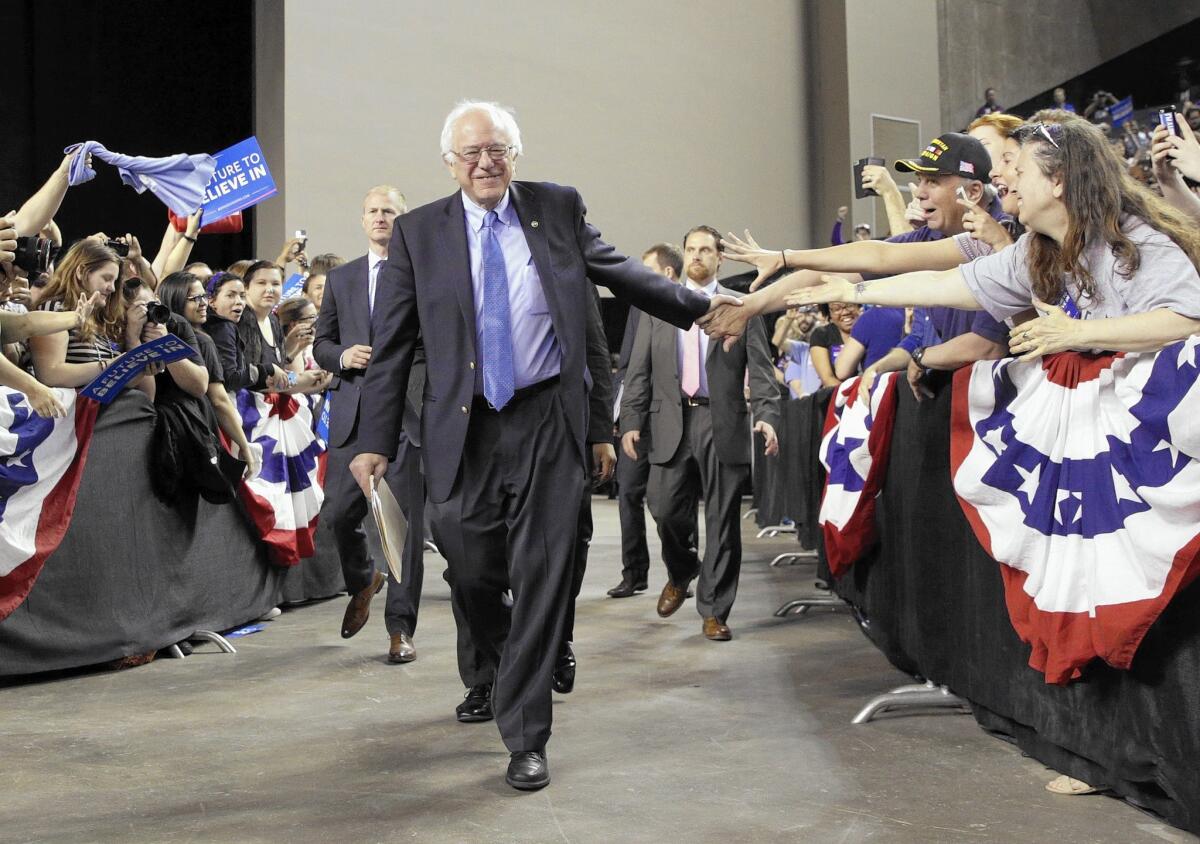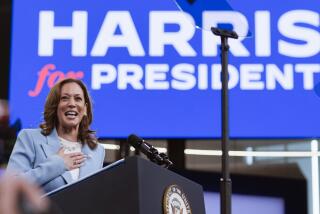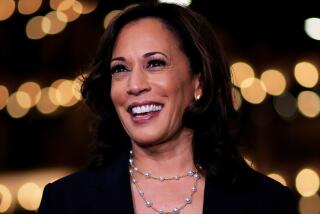Sanders campaign’s new strategy on superdelegates leaves some unimpressed

- Share via
Reporting from READING, Pa. — Retired teachers Rosie Skomitz and Ron Stouffer, part of the raucous crowd that packed an old theater here last week to cheer on a Bernie Sanders revolution, have no love for Democratic superdelegates, the party insiders who have helped Hillary Clinton pad her lead in the race for the nomination for president.
“It takes votes away from people and gives them to the elite,” Skomitz said, summing up the typical complaint from the Sanders faithful that the nomination process is undemocratic.
But as Sanders falls further behind Clinton in amassing delegates who will choose the nominee, some of his supporters have replaced their criticism and occasional outright virulence with appeals to those Democratic elites — some of whom have long memories.
Election 2016 | Live coverage on Trail Guide | Track the delegate race | Sign up for the newsletter
“You’re trying to woo us now, but we remember when you were trashing us,” said former Pennsylvania Gov. Ed Rendell, one of 21 superdelegates from the state, the largest of five that hold primaries Tuesday.
When Sanders was winning primaries in places like Michigan and Colorado, he and his supporters criticized superdelegates — Democratic leaders who can support a candidate of their choosing — as exemplary of a rigged system that robbed voters of their voice. In petitions, emails and some nasty messages on social media, thousands of Sanders backers demanded that those delegates follow the lead of their states’ voters.
But with time running out, Sanders’ campaign has switched to a different argument: Even if Clinton ultimately wins more votes and pledged delegates, the superdelegates should back Sanders because he’d have a better chance at beating Donald Trump or whoever wins the Republican nomination.
“We want to make a case to superdelegates that Bernie Sanders is the strongest candidate,” said Mark Longabaugh, a senior campaign strategist. Superdelegates will have to balance voters’ wishes with their political judgment, he said: “Both considerations are there. Every individual superdelegate will have to make their own decision.”
Sanders trails Clinton by 275 pledged delegates but can count on the support of only 38 superdelegates, compared with 502 for Clinton, according to a count by the Associated Press. (The Sanders campaign says 42 superdelegates support him.)
Superdelegates have been catching a lot of vituperation, says Rendell, a longtime supporter of both Bill and Hillary Clinton and former Democratic national chairman.
“‘You’re a scumbag, you’re a tool of the capitalist system, a fascist,’” he said, citing insults lobbed by Sanders backers. “… It’s not the campaign — it’s some of his crazy supporters.”
One Sanders follower sent an email saying “I know who you are” to Rick Bloomingdale, president of the state AFL-CIO and a Clinton supporter.
You’re trying to woo us now, but we remember when you were trashing us.
— Former Pennsylvania Gov. Ed Rendell, one of the state’s 21 Democratic superdelegates, on the Sanders campaign’s effort to win his support
“I asked the guy, ‘Is that a threat, or what are you saying to me?’” said Bloomingdale, who noted that most of the emails he’d gotten from Sanders backers were polite.
It was wrong and dumb for Sanders supporters to make personal attacks on superdelegates, say both Longabaugh and Joshua Grossman, president of Progressive Kick, a super PAC lined up behind Sanders.
“It certainly wasn’t us,” Grossman said. “There are millions of people in the U.S. Not all of them are temperate human beings at all moments.”
The Democratic Party put the superdelegate system in place starting in 1984 as a reaction to changes that had given voters a bigger say in choosing nominees. For party leaders, the final straw was the stormy primary season and convention of 1980 that many Democrats thought helped drag down President Carter’s chances for reelection.
The idea was to give members of Congress, governors and other party stalwarts a bigger voice at the convention, says Elaine Kamarck, a senior fellow at the Brookings Institution and author of a book on the nomination rules. Kamarck worked in Bill Clinton’s White House and is a superdelegate who backs Hillary Clinton.
“This is not a public process — this is a party process,” Kamarck said. “They have an interest slightly different from the average voter. They have an interest in the brand.”
Superdelegates have never overturned the popular choice, and Kamarck says it’s unlikely that they would to help Sanders, a democratic socialist who served 25 years in the House and Senate as an independent, not a Democrat.
Many Clinton-friendly superdelegates turned to Barack Obama in 2008, she says, but only after he built a comfortable lead. Those superdelegates helped Obama close out the race; Clinton conceded that June.
“If you can’t argue that you won the most popular votes, it’s hard to go to people who are close to Hillary and think she would be a very good president and argue that they should start switching,” Kamarck said.
Sanders has said he is at a disadvantage in states like New York and Pennsylvania, where independents can’t vote in primaries. He called Clinton “the candidate of the establishment” in a recent interview with CBS but said superdelegates would come to his side when they realized “we are defeating Trump by much larger numbers” than Clinton in polls.
That argument is fragile, though; polls of hypothetical general election matchups at this stage of a presidential race generally have little relationship with an outcome. “We are sophisticated enough to know that that’s because no one has done a negative ad about Sen. Sanders, whereas she has taken incoming for 23 years,” Rendell said of Clinton.
Some progressive groups who back Sanders have gathered more than 200,000 signatures on a state-by-state petition campaign that calls on superdelegates to get behind the candidate who wins the most votes. That may not be Sanders, conceded Grossman, one of the organizers.
“Whoever has a majority of elected delegates deserves the nomination,” he said. “We’ve been saying that since Day One.”
The Sanders camp faces a tough road in trying to sway superdelegates in Pennsylvania, where most of the Democratic machinery and voters have been solidly with Clinton for years. In 2008, she carried the state by 9 points even though the race had begun to tilt decisively in Obama’s favor.
At least 18 of the state’s superdelegates have declared for Clinton, according to a contact list compiled by Sanders backers.
They should save their breath, says Pennsylvania superdelegate Tony Coelho, who backs Clinton “about 100 times over.”
“She is the candidate, in my view of the Democratic Party,” said Coelho, a former California congressman who now splits his time between Pennsylvania and Delaware. “Bernie is not even a Democrat.”
Bloomingdale says Sanders backers are angry about the undemocratic nature of superdelegates, and he doesn’t disagree.
“I certainly would support changing the rules, but not in the middle of the campaign,” he said. “It’s like adding a fourth out to the team that’s behind to give them a chance to catch up.”
Times staff writer Cathleen Decker in Philadelphia contributed to this report.
ALSO
A truce between Bernie Sanders and Hillary Clinton? Not so fast.
Donald Trump starts shift toward November clash with Hillary Clinton
The presidential election has Obama explaining it to concerned foreign leaders
More to Read
Get the L.A. Times Politics newsletter
Deeply reported insights into legislation, politics and policy from Sacramento, Washington and beyond. In your inbox three times per week.
You may occasionally receive promotional content from the Los Angeles Times.









